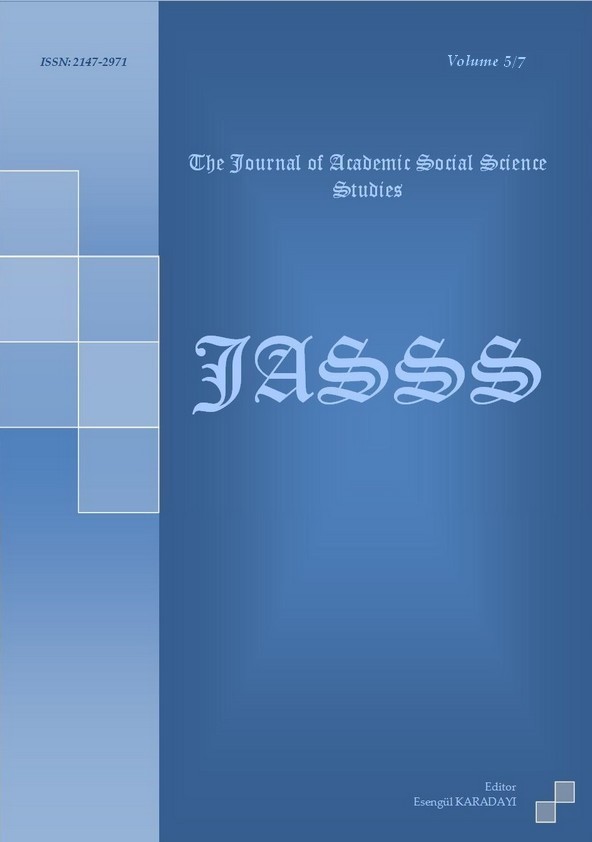Author :
Abstract
Her anlamda büyük değişmelerin yaşandığı Tanzimat Dönemi’nin öncü yazarlarından Namık Kemâl, şiir, roman ve tiyatro eserlerinde önceki dönemlerden farklı bir “insan tipi” yetiştirme kaygısındadır. “Yeni İnsan” tipi olarak adlandırabileceğimiz karakterler, millî şuurla yetişmiş, vatansever, özgür, âdil, dürüst ve haksızlığa göz yummayan insanlardır. Geçici olan dünyada, vatana bağlı olarak aşağılıklara kapılmadan onur ve şerefiyle yaşamayı insanın şanından bilen yazar, eserlerinde okuyucuya benimsetmeye çalıştığı karakterlerin çoğuna böyle bir şahsiyet kazandırır. Eserlerinde zıt kutuplu karakterler kurgulamayı tercih eden Namık Kemâl, olumsuz niteliklere sahip ve ahlâksızlığıyla öne çıkan kişiler karşısına, idealize ettiği tipleri koyarak okuyucunun tercihini yönlendirir. İdealize ettiği tipler, genellikle Türk ve İslam tarihine bağlı, misyon sahibi, vatan ve millet davalarıyla meşgul, cesaret sahibi kimselerdir. Eserlerinde kurguladığı bu “yeni insan tipi” Tanzimat Edebiyatı’nın ilkeleri ve genel amaçlarıyla da örtüşen topluma mesaj verme fonksiyonuna sahip karakterlerdir. Bu insan tipi skolastik zihniyete karşı çıkan, kaynağını akıl ve iradesinden alan bir mücadele anlayışına sahiptir. Toplum sorunlarına duyarsız kalmayan bu insanlar, aşklarında da sadık kimselerdir. Yazara göre, toplumun değişmesi her şeyden önce kişinin kendisini değiştirmesiyle mümkündür. Bu yaklaşım, kaderci anlayıştan ziyade kendi yaşam felsefesini kendi oluşturan aktif insan modeliyle okuyucuyu karşılaştırır. Namık Kemâl, düşünce yazılarında dile getirdiği dünya görüşünü, kurguladığı eserlerdeki kahramanlara yaşattığı olaylarla okuyucuya benimsetmeye çalışır. O sahip olduğu düşünceleri her ne kadar şiir ve romanlarında genel olarak mesaj verme amaçlı kullansa da ona göre tiyatro, bu anlamda en etkili ve en kalıcı bir yöntem olarak yazarların yönelmesi gereken bir sanat dalıdır. Bu çalışmada Namık Kemâl’in roman ve tiyatrolarında kurguladığı insan tiplerinden yola çıkarak düşünce dünyasına ulaşılmaya çalışılmıştır.
Keywords
Abstract
Namık Kemâl is one of the pioneering authors of the ‘Tanzimat’ Reform Era when the Ottoman Empire underwent drastic changes in all respects and his main concern in his poetry, novels and plays is to create a ‘human type’ different from the ones in the preceding periods. The characteristics of this “new human” involve a national awareness, patriotism, liberty, fairness, honesty and standing against injustice. For the author, it is becoming of a man to live with honor and dignity, with loyalty to his country and without surrendering inferiority complex in this transient world. Therefore in his works he adorns his characters with these noble traits with an aim to make the reader adopt the idea. Deploying his characters on opposite poles, Namık Kemâl manipulates the reader by presenting ideal stereotypes against those who have bad traits and are notorious for their immorality. The ideal stereotypes are generally courageous men with a mission who embrace the Turkish and Islamic history and culture and who are engaged in a cause for their country and nation. This “new human” type also serves the function of giving society messages that are in compliance with the principles and general aims of ‘Tanzimat Literature’. This human type rejects scholastic thought and adopts an approach of struggle the source of which is human reason and will. These characters are not only sensitive and responsive to social problems but also faithful to their beloved ones. For the author, it is only possible to change the society by changing one’s his own attitudes first. This approach introduces the reader an active human model who, rather than adopting a fatalistic understanding, develops his own philosophy of life. Namık Kemâl tries to impose the worldview he declares in his articles to the reader through incidents and events his fictional protagonists go through. Although Namık Kemâl presents his ideas in his poetry and novels with an attempt to convey his message, he thinks that authors should focus on theatre as it is the most effective and perpetual means to this end. The aim of this study is to research Namık Kemâl’s intellectual world based on the characters in his novels and plays.





